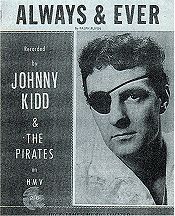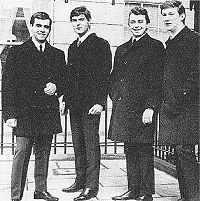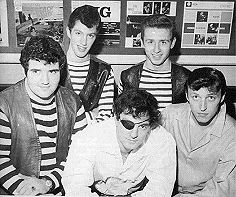4: 1964-65: Right String Baby, But...
|
On March 4th 1964 Johnny and the crew recorded a version of the Neapolitan song "Santa Lucia" with revised English lyrics and re-titled "Always And Ever." This was a fun number to record by all accounts, even featuring Johnny's agent George Cooper, the band's loyal roadie Johnny Irving and all three Pirates on the "la La La" refrain. A performance of the song was pre-recorded for transmission on BBC Televisions' "Top Of The Pops" in advance of the single making the upper reaches of the charts. Unashamedly commercial, it's not a bad topside, but it just ain't quite the Guv'nor. Green’s playing is dependable as ever but has little room for manoeuvre. Following two classy beat singles it suffers by further leaving behind the style that made the group stand out in the first place and Kidd didn't quite have the huge, loyal base of dedicated fans who would by anything he put out. Consequentially, the song struggled to make no. 46. He shines on the flipside however, the wild "Dr. Feelgood," another classic slice of R&B. With hindsight this might have made a more appropriate A-side bearing in mind the R&B scene that was beginning to unfold.
To capitalise on Kidd's current good form work finally began on a long-awaited debut album. About this time ex-Redcap organist Vic Cooper, a good friend of Spence and Farley's was recruited from Cuddly Duddly. The new quintet returned to Abbey Road on April 6/7 1964 where they recorded eleven masters, possibly for the proposed, long-awaited debut album. Amongst them were three re-makes including a new, slower, beat version of "Please Don't Touch" which was superb, buoyed considerably by Green's quite startling solo. More on the "Lost Album" can be found in the Releases section.
Gordon Mills’ "Jealous Girl" coupled with "Shop Around" (rescued from the doomed album sessions) was Kidd's most overtly Beatles-influenced release. Unfortunately Mick Green is sandwiched in between Cooper's (albeit quieter) organ and Kidd's double tacked vocals, his solo fighting for space. Although a steady seller it missed completely leading to two further masters, "I Know" and "Where Are You," the latter of which is an absolute gem (although again, not really what Kidd was all about), remaining unreleased. In August, the band were playing in The Big Star Show at the Rainbow Theatre on the South Pier, Blackpool on a bill that included the Tornados and Joe Brown with his Bruvvers. Mick Green was fed up and a little bored.
Mick Green - "I hated every minute of it. All the boys had their wives with them and I was stuck in a bedsit. It was cold and miserable and we used to follow this dog act on stage. I got a call from Robin MacDonald of the Dakotas (who backed Billy J. Kramer) saying they were off to Hawaii in ten days time and from there were going to Australia, which seemed a good idea at the time. Well, I couldn't be in both bands at once..."
|
|
Green opted for the financial security of Kramer (who'd recently scored the biggest hit of his career with "Little Children") leaving a big gap in the Pirates, Tornado guitarist Stuart Taylor helped out until a replacement could be sourced. Johnny Irving drove Kidd back down to London and some rapid auditions took place. They returned with Kidd fan John Weider, previously of Steve Marriot's Moments and the Tony Meehan Combo. Heavy traffic around the Preston area ensured they returned late for that evenings performance and Larry Parnes (the Blackpool shows' promoter, a.k.a. "Mr. Parnes Shillings & Pence"!), gave the band four-weeks notice for breach of contract despite there being only seven weeks to go.....
Promoter Bob Potter (of Lakeside Country Club and World Darts fame) started putting more work Kidd's way at venues like Woking's Atlanta Ballroom, Aldershot's Palais De Dance and his main site, Camberley's Agincourt Ballroom where the ultra-violet painted Galleon backcloth they acquired in Hamburg was to hang for many years. EMI meanwhile, culled a couple of Country & Western numbers from the doomed album sessions and issued them as a stopgap 45. A-side billing went to the bouncy "Whole Lotta Woman", originally a number 1 for its author, American Indian Marvin Rainwater, underneath was a fine rendition of Hank Williams’ "Your Cheatin' Heart". Kidd's strong, emotional tones show well on the B-side and it was remarkable that Kidd was adventurous enough in being one of the few acts around at the time who attempted country music, albeit adapted to suit his R&B style.
The whole of January 1965 was spent on a tour to Hamburg. As John Weider was only seventeen, local Hamburg rules dictated he was allowed only two days work, so Kidd hired guitarist Barry Hammett of the Primitives for the remaining dates. During February, Weider debuted on Kidd's version of Jewel Atkins "The Birds And The Bees" which was, if the session sheets are to be believed, released four days after the final overdubs were completed. Unfortunately, the extra work did not result in a hit. The B-side, Mort Shuman and Kenny Lynch’s "Don't Make The Same Mistake As I did" might have done better. The single was promoted on Granada TV's "Five O-Clock Club" with an outdoor location and marked the end of Johnnys' television appearances. New material was attempted in trying to find a new sound: "The World Is Round", "Shotgun", "The Whole World Is Shakin", Out Of Sight", and Otis Redding's "Can't Turn You Loose" which was actually recorded at EMI. It benefited Kidd’s strong voice, yet it became just another example of a superior recording which remained unreleased for nearly 20 years. Johnny Kidd the performer was still a popular pull but Johnny Kidd the recording artist was now clearly trapped between two stools: he wanted to develop and progress but the public still recognised him as representing a somewhat distant, dim, pre-Beat era. In the "JukeBox Heroes" television tribute Mick Green said it was a shame that Kidd didn't develop his songwriting during this period. Although playing around with song ideas his collaboration with Green on "Then I Got Everything" on the flip of 1963's "I'll Never Get Over You" was his last songwriting credit.



